Deck 5: The Integumentary System
Question
Question
Question
Question
Question
Question
Question
Question
Question
Question
Question
Question
Question
Question
Question
Question
Question
Question
Question
Question
Question
Question
Question
Question
Question
Question
Question
Question
Question
Question
Question
Question
Question
Question
Question
Question
Question
Question
Question
Question
Question
Question
Question
Question
Question
Question
Question
Question
Question
Question
Question
Question
Question
Question
Question
Question
Question
Question
Question
Question
Question
Question
Question
Question
Question
Question
Question
Question
Question
Question
Question
Question
Question
Question
Question

Unlock Deck
Sign up to unlock the cards in this deck!
Unlock Deck
Unlock Deck
1/75
Play
Full screen (f)
Deck 5: The Integumentary System
1
Together, the skin, hair, nails, glands, and associated muscles and nerves are an example of a/an:
A) tissue
B) organ
C) system
D) organism
A) tissue
B) organ
C) system
D) organism
C
2
Contraction of the _____ cause(s) "goose bumps."
A) hair follicle
B) underlying skeletal muscle
C) arrector pili muscle
D) capillary loops in the papillary region of the dermis
A) hair follicle
B) underlying skeletal muscle
C) arrector pili muscle
D) capillary loops in the papillary region of the dermis
C
3
Orientation of which dermal fibers is responsible for "lines of cleavage" (tension lines) seen in the skin?
A) reticular
B) collagen
C) elastic
D) none of these choices
A) reticular
B) collagen
C) elastic
D) none of these choices
B
4
Which of the following statements about skin color is false?
A) Three pigments that are responsible for skin color are hemoglobin, carotene, and melanin.
B) UV exposure leads to increased production of melanin.
C) Melanin is produced in the organelles of epithelial cells and then migrates to the hypodermis.
D) Carotene contributes a yellow-orange hue to the skin.
A) Three pigments that are responsible for skin color are hemoglobin, carotene, and melanin.
B) UV exposure leads to increased production of melanin.
C) Melanin is produced in the organelles of epithelial cells and then migrates to the hypodermis.
D) Carotene contributes a yellow-orange hue to the skin.

Unlock Deck
Unlock for access to all 75 flashcards in this deck.
Unlock Deck
k this deck
5
Tattoos are created by injecting ink with a needle into the _____.
A) stratum basale
B) dermis
C) subcutaneous layer
D) stratum corneum
A) stratum basale
B) dermis
C) subcutaneous layer
D) stratum corneum

Unlock Deck
Unlock for access to all 75 flashcards in this deck.
Unlock Deck
k this deck
6
The integument consists of which of the following?
A) skin and subcutaneous layer
B) epidermis and dermis
C) cutaneous membrane and underlying muscle
D) papillary and reticular regions
A) skin and subcutaneous layer
B) epidermis and dermis
C) cutaneous membrane and underlying muscle
D) papillary and reticular regions

Unlock Deck
Unlock for access to all 75 flashcards in this deck.
Unlock Deck
k this deck
7
The narrow strip of epidermis found on the surface of the proximal border of a nail is called _____.
A) eponychium (cuticle)
B) free edge
C) lunula
D) hyponychium
A) eponychium (cuticle)
B) free edge
C) lunula
D) hyponychium

Unlock Deck
Unlock for access to all 75 flashcards in this deck.
Unlock Deck
k this deck
8
Which of the following is characteristic of the growth of a scalp hair?
A) continuous steady growth until the hair is shed and replaced by a new hair
B) alternating growth phases and resting phases throughout the life of the hair
C) a resting phase followed by a growth phase, which lasts until the hair is shed and replaced by a new hair
D) a growth phase followed by a resting phase, which lasts until the hair is shed and replaced by a new hair
A) continuous steady growth until the hair is shed and replaced by a new hair
B) alternating growth phases and resting phases throughout the life of the hair
C) a resting phase followed by a growth phase, which lasts until the hair is shed and replaced by a new hair
D) a growth phase followed by a resting phase, which lasts until the hair is shed and replaced by a new hair

Unlock Deck
Unlock for access to all 75 flashcards in this deck.
Unlock Deck
k this deck
9
The ability of skin to stretch and recoil is due to the presence of _____ in the _____.
A) elastic fibers, epidermis
B) adipose tissue, dermis
C) elastic fibers, dermis
D) basement membrane, hypodermis
A) elastic fibers, epidermis
B) adipose tissue, dermis
C) elastic fibers, dermis
D) basement membrane, hypodermis

Unlock Deck
Unlock for access to all 75 flashcards in this deck.
Unlock Deck
k this deck
10
What word does the letter "B" stand for in the American Cancer Society's ABCD guidelines for detecting malignant melanoma?
A) big (greater than 6mm)
B) brown/black pigmentation
C) border is irregular
D) blister
A) big (greater than 6mm)
B) brown/black pigmentation
C) border is irregular
D) blister

Unlock Deck
Unlock for access to all 75 flashcards in this deck.
Unlock Deck
k this deck
11
Functions of the skin include:
A) excretion of some wastes
B) acting as a blood reservoir
C) acting in immunity
D) all of these choices
A) excretion of some wastes
B) acting as a blood reservoir
C) acting in immunity
D) all of these choices

Unlock Deck
Unlock for access to all 75 flashcards in this deck.
Unlock Deck
k this deck
12
Melanocytes synthesize melanin from which amino acid?
A) tryptophan
B) tyrosine
C) tropomyosin
D) thyroxine
A) tryptophan
B) tyrosine
C) tropomyosin
D) thyroxine

Unlock Deck
Unlock for access to all 75 flashcards in this deck.
Unlock Deck
k this deck
13
Which of the following statements is true?
A) Melanoma is the most common form of skin cancer.
B) Squamous cell carcinoma is the most likely form of skin cancer to metastasize.
C) Basal cell carcinoma rarely metastasizes.
D) Skin color and family history are not risk factors for skin cancer.
A) Melanoma is the most common form of skin cancer.
B) Squamous cell carcinoma is the most likely form of skin cancer to metastasize.
C) Basal cell carcinoma rarely metastasizes.
D) Skin color and family history are not risk factors for skin cancer.

Unlock Deck
Unlock for access to all 75 flashcards in this deck.
Unlock Deck
k this deck
14
Which of the following contributes to the increased incidence of heat stroke in the elderly?
A) decreased circulation
B) decreased sudoriferous gland activity
C) decreased number of melanocytes
D) increased number of intraepidermal macrophages (Langerhans cells)
A) decreased circulation
B) decreased sudoriferous gland activity
C) decreased number of melanocytes
D) increased number of intraepidermal macrophages (Langerhans cells)

Unlock Deck
Unlock for access to all 75 flashcards in this deck.
Unlock Deck
k this deck
15
Calluses form in areas that
A) have excessive blood flow
B) have insufficient nerve supply
C) are subject to friction
D) undergo slowed rate of mitosis
A) have excessive blood flow
B) have insufficient nerve supply
C) are subject to friction
D) undergo slowed rate of mitosis

Unlock Deck
Unlock for access to all 75 flashcards in this deck.
Unlock Deck
k this deck
16
Cells in the deepest layer of the epidermis divide to produce all other epidermal cells. From deepest to most superficial, the cells pass through the layers in what order?
1) stratum spinosum
2) stratum basale
3) stratum corneum
4) stratum lucidum (only in thick skin)
5) stratum granulosum
A) 1, 2, 3, 4, 5
B) 2, 3, 1, 5, 4
C) 3, 2, 4, 1, 5
D) 2, 1, 5, 4, 3
1) stratum spinosum
2) stratum basale
3) stratum corneum
4) stratum lucidum (only in thick skin)
5) stratum granulosum
A) 1, 2, 3, 4, 5
B) 2, 3, 1, 5, 4
C) 3, 2, 4, 1, 5
D) 2, 1, 5, 4, 3

Unlock Deck
Unlock for access to all 75 flashcards in this deck.
Unlock Deck
k this deck
17
As keratinocytes move to the surface
A) they become multinucleate
B) they divide to produce new skin cells
C) they eventually die and are sloughed off
D) all of these choices
A) they become multinucleate
B) they divide to produce new skin cells
C) they eventually die and are sloughed off
D) all of these choices

Unlock Deck
Unlock for access to all 75 flashcards in this deck.
Unlock Deck
k this deck
18
Which of the following is not considered an epidermal derivative?
A) sebaceous glands
B) lamellated corpuscles
C) sudoriferous glands
D) hair
A) sebaceous glands
B) lamellated corpuscles
C) sudoriferous glands
D) hair

Unlock Deck
Unlock for access to all 75 flashcards in this deck.
Unlock Deck
k this deck
19
Which of the following is found in the stratum basale?
A) cuboidal or columnar shaped cells
B) keratinocytes
C) melanocytes
D) all of these choices
A) cuboidal or columnar shaped cells
B) keratinocytes
C) melanocytes
D) all of these choices

Unlock Deck
Unlock for access to all 75 flashcards in this deck.
Unlock Deck
k this deck
20
The greatest amount of keratin is found where?
A) stratum basale
B) stratum spinosum
C) stratum corneum
D) reticular region of the dermis
A) stratum basale
B) stratum spinosum
C) stratum corneum
D) reticular region of the dermis

Unlock Deck
Unlock for access to all 75 flashcards in this deck.
Unlock Deck
k this deck
21
A callus is a thickening of the dermis caused by excessive friction.

Unlock Deck
Unlock for access to all 75 flashcards in this deck.
Unlock Deck
k this deck
22
Fingernails consist of hardened glandular secretions from the tissue of the nail root.

Unlock Deck
Unlock for access to all 75 flashcards in this deck.
Unlock Deck
k this deck
23
Differences in skin color are mainly due to the number of melanocytes in the epidermis.

Unlock Deck
Unlock for access to all 75 flashcards in this deck.
Unlock Deck
k this deck
24
The skin is supplied with blood by two arterial plexuses called the papillary plexus and the cutaneous plexus.

Unlock Deck
Unlock for access to all 75 flashcards in this deck.
Unlock Deck
k this deck
25
Albinism is caused by a total lack of melanocytes.

Unlock Deck
Unlock for access to all 75 flashcards in this deck.
Unlock Deck
k this deck
26
Acne is an inflammation of sebaceous glands.

Unlock Deck
Unlock for access to all 75 flashcards in this deck.
Unlock Deck
k this deck
27
Three major types of skin are recognized on the basis of certain structural and functional properties: thin skin, intermediate skin, and thick skin.

Unlock Deck
Unlock for access to all 75 flashcards in this deck.
Unlock Deck
k this deck
28
Following a burn, charring and insensitivity to pain was found over the entire surface of the right lower limb, entire surface of right trunk and anterior surface of the right upper limb. Approximately what percent of the body surface had burns and how would you classify the burn?
A) 18%; second degree
B) 27%, third degree
C) 32%, partial thickness
D) 40%, third degree
A) 18%; second degree
B) 27%, third degree
C) 32%, partial thickness
D) 40%, third degree

Unlock Deck
Unlock for access to all 75 flashcards in this deck.
Unlock Deck
k this deck
29
Which of the following terms best describes a bluish skin color most likely resulting from an inadequate amount of oxygen circulating in the blood?
A) erythema
B) cyanosis
C) albinism
D) hirsutism
A) erythema
B) cyanosis
C) albinism
D) hirsutism

Unlock Deck
Unlock for access to all 75 flashcards in this deck.
Unlock Deck
k this deck
30
Thin skin has fewer epidermal ridges, sudoriferous glands, and sensory receptors than thick skin.

Unlock Deck
Unlock for access to all 75 flashcards in this deck.
Unlock Deck
k this deck
31
Thick skin, containing all five layers of the epidermis, is found in areas of all of the following except _____.
A) palms
B) soles
C) fingertips
D) upper back
A) palms
B) soles
C) fingertips
D) upper back

Unlock Deck
Unlock for access to all 75 flashcards in this deck.
Unlock Deck
k this deck
32
The lunula of a nail appears whiter than the rest of the nail due to the structure of the stratum basale.

Unlock Deck
Unlock for access to all 75 flashcards in this deck.
Unlock Deck
k this deck
33
The cutaneous plexus is located in the epidermis and supplies cells of the epidermis and upper dermis with blood.

Unlock Deck
Unlock for access to all 75 flashcards in this deck.
Unlock Deck
k this deck
34
What is the correct order for the development of the dermis?
A) mesoderm; mesenchyme; fibroblasts
B) endoderm; mesenchyme; keratinocytes
C) ectoderm; fibroblasts; melanocytes
D) mesoderm; collagen; mesenchyme
A) mesoderm; mesenchyme; fibroblasts
B) endoderm; mesenchyme; keratinocytes
C) ectoderm; fibroblasts; melanocytes
D) mesoderm; collagen; mesenchyme

Unlock Deck
Unlock for access to all 75 flashcards in this deck.
Unlock Deck
k this deck
35
The papillae of hair fill with ectoderm in which blood vessels develop.

Unlock Deck
Unlock for access to all 75 flashcards in this deck.
Unlock Deck
k this deck
36
The two principal layers of skin are the epidermis and the subcutaneous layer.

Unlock Deck
Unlock for access to all 75 flashcards in this deck.
Unlock Deck
k this deck
37
One of the factors responsible for skin color differences among races is the amount of melanin the keratinocytes produce and transfer to melanocytes.

Unlock Deck
Unlock for access to all 75 flashcards in this deck.
Unlock Deck
k this deck
38
Cells in the three most superficial layers of the epidermis receive a large supply of blood from blood vessels in the dermis.

Unlock Deck
Unlock for access to all 75 flashcards in this deck.
Unlock Deck
k this deck
39
The _____ gives rise to the epidermis.
A) mesenchyme
B) ectoderm
C) mesoderm
D) endoderm
A) mesenchyme
B) ectoderm
C) mesoderm
D) endoderm

Unlock Deck
Unlock for access to all 75 flashcards in this deck.
Unlock Deck
k this deck
40
The deepest layer of the skin is called the hypodermis.

Unlock Deck
Unlock for access to all 75 flashcards in this deck.
Unlock Deck
k this deck
41
Thin skin lacks the stratum _____ layer of the epidermis.

Unlock Deck
Unlock for access to all 75 flashcards in this deck.
Unlock Deck
k this deck
42
Surface patterns that develop on the skin of the hands and feet are due to the presence of dermal papillae and are called _____ ridges.

Unlock Deck
Unlock for access to all 75 flashcards in this deck.
Unlock Deck
k this deck
43
The _____ of the hair is the portion that projects from the surface of the skin.

Unlock Deck
Unlock for access to all 75 flashcards in this deck.
Unlock Deck
k this deck
44
Describe the tissues and structures of the two regions (layers) of the dermis.

Unlock Deck
Unlock for access to all 75 flashcards in this deck.
Unlock Deck
k this deck
45
Vitamin D synthesis begins in the skin as a result of UV radiation altering a precursor molecule.

Unlock Deck
Unlock for access to all 75 flashcards in this deck.
Unlock Deck
k this deck
46
Describe the layers of the epidermis and discuss growth of the epidermis. Include a description of the different cell types. Accompany your answer with a labeled diagram.

Unlock Deck
Unlock for access to all 75 flashcards in this deck.
Unlock Deck
k this deck
47
"Goose bumps" on the skin are due to contraction of smooth muscles called _____, which are associated with hair follicles.

Unlock Deck
Unlock for access to all 75 flashcards in this deck.
Unlock Deck
k this deck
48
Explain how wrinkles result as a normal consequence of aging.

Unlock Deck
Unlock for access to all 75 flashcards in this deck.
Unlock Deck
k this deck
49
Most of the age-related changes associated with the integumentary system occur in the epidermis.

Unlock Deck
Unlock for access to all 75 flashcards in this deck.
Unlock Deck
k this deck
50
Describe the changes that occur in skin with age.

Unlock Deck
Unlock for access to all 75 flashcards in this deck.
Unlock Deck
k this deck
51
Describe the damage of first, second, and third degree burns.

Unlock Deck
Unlock for access to all 75 flashcards in this deck.
Unlock Deck
k this deck
52
In the fifth or sixth month of fetal development, hair follicles produce delicate fetal hair called _____, which is usually shed prior to birth.

Unlock Deck
Unlock for access to all 75 flashcards in this deck.
Unlock Deck
k this deck
53
The concentric layers of a hair from external to internal are _____, _____, and _____.

Unlock Deck
Unlock for access to all 75 flashcards in this deck.
Unlock Deck
k this deck
54
The layer of the epidermis containing the most layers of cells is the stratum _____.

Unlock Deck
Unlock for access to all 75 flashcards in this deck.
Unlock Deck
k this deck
55
Keratohyalin granules are characteristic of the stratum _____ layer of the epidermis.

Unlock Deck
Unlock for access to all 75 flashcards in this deck.
Unlock Deck
k this deck
56
Vernix caseosa is secreted by sebaceous glands to protect the fetus from amniotic fluid.

Unlock Deck
Unlock for access to all 75 flashcards in this deck.
Unlock Deck
k this deck
57
Discuss the three common forms of skin cancer.

Unlock Deck
Unlock for access to all 75 flashcards in this deck.
Unlock Deck
k this deck
58
Development of blisters following exposure of skin to heat is indicative of a first-degree burn.

Unlock Deck
Unlock for access to all 75 flashcards in this deck.
Unlock Deck
k this deck
59
Epithelial cells from the _____ give rise to the sebaceous glands during fetal development.

Unlock Deck
Unlock for access to all 75 flashcards in this deck.
Unlock Deck
k this deck
60
Lipids released by _____ granules of keratinocytes are responsible for reducing the passage of water through the skin.

Unlock Deck
Unlock for access to all 75 flashcards in this deck.
Unlock Deck
k this deck
61
Give two different names for the layer indicated by C. 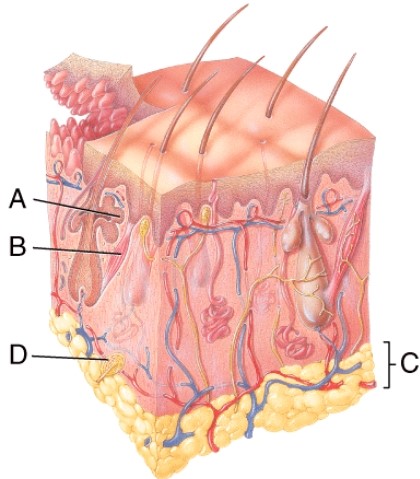


Unlock Deck
Unlock for access to all 75 flashcards in this deck.
Unlock Deck
k this deck
62
In regards to thermoregulatory sweating, sweat that evaporates from the skin before it is perceived as moisture is termed _____ perspiration; whereas sweat that is excreted in larger amounts and is seen as moisture on the skin is called _____ perspiration.

Unlock Deck
Unlock for access to all 75 flashcards in this deck.
Unlock Deck
k this deck
63
Identify the layer sometimes referred to as stratum germinativum because of its role in forming new cells. 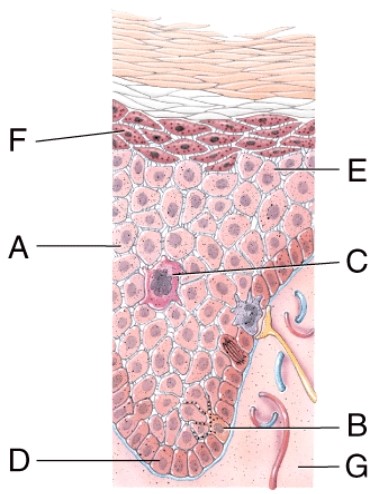


Unlock Deck
Unlock for access to all 75 flashcards in this deck.
Unlock Deck
k this deck
64
______ is due to a buildup of the yellow pigment bilirubin in the skin. This condition gives a yellowish appearance to the skin and the whites of the eyes, and usually indicates liver disease.

Unlock Deck
Unlock for access to all 75 flashcards in this deck.
Unlock Deck
k this deck
65
Identify the type of cell that has an immune function. 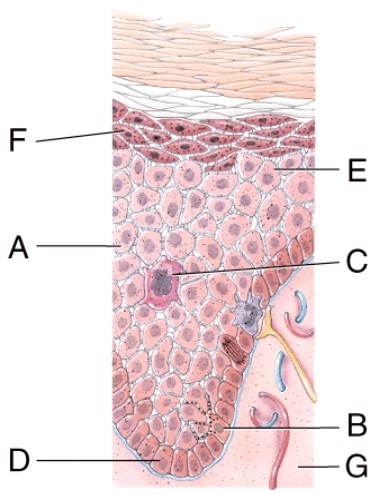


Unlock Deck
Unlock for access to all 75 flashcards in this deck.
Unlock Deck
k this deck
66
C is pointing to what structure? 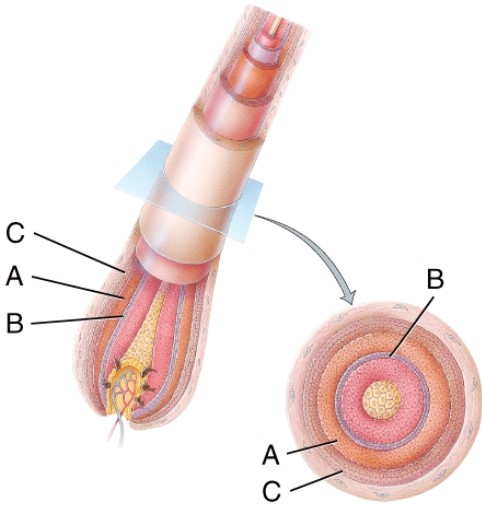


Unlock Deck
Unlock for access to all 75 flashcards in this deck.
Unlock Deck
k this deck
67
Identify the specific layer in which cells begin dying. 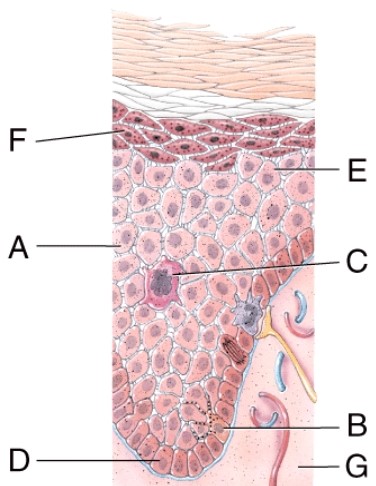


Unlock Deck
Unlock for access to all 75 flashcards in this deck.
Unlock Deck
k this deck
68
Name the specialized receptor indicated by D. 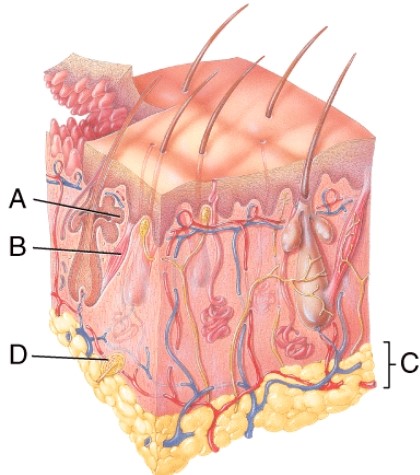


Unlock Deck
Unlock for access to all 75 flashcards in this deck.
Unlock Deck
k this deck
69
Identify the cell type that produces melanin. 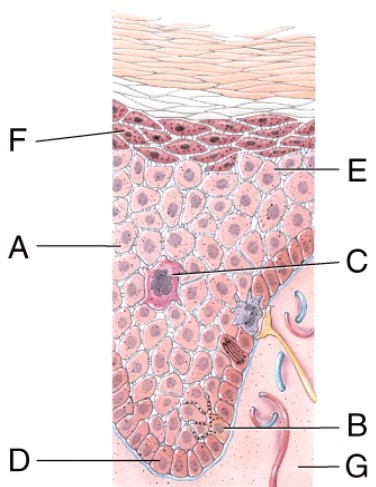


Unlock Deck
Unlock for access to all 75 flashcards in this deck.
Unlock Deck
k this deck
70
Identify the specific structure indicated by B. 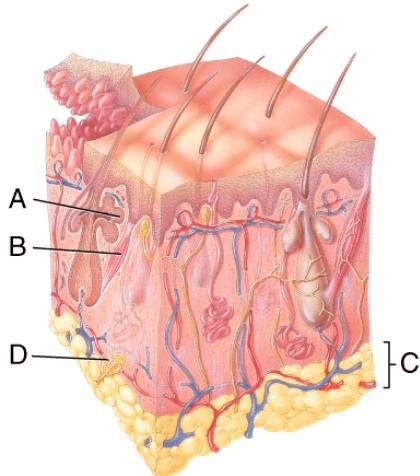


Unlock Deck
Unlock for access to all 75 flashcards in this deck.
Unlock Deck
k this deck
71
B is pointing to what structure? 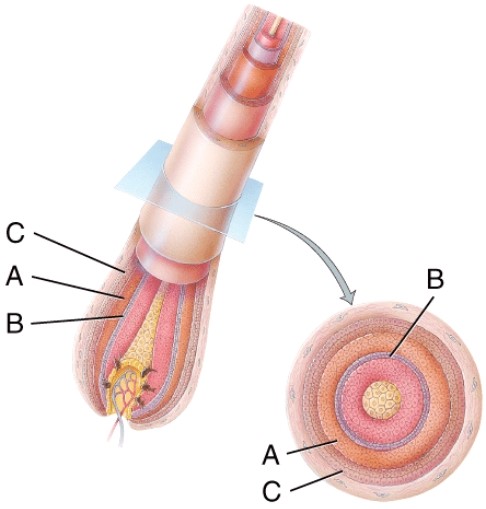


Unlock Deck
Unlock for access to all 75 flashcards in this deck.
Unlock Deck
k this deck
72
A mild sunburn is an example of a _____ burn and involves only the _____ layer of the skin.

Unlock Deck
Unlock for access to all 75 flashcards in this deck.
Unlock Deck
k this deck
73
A is pointing to what structure? 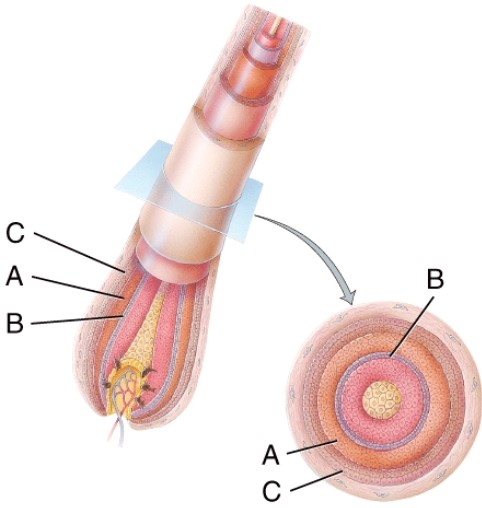


Unlock Deck
Unlock for access to all 75 flashcards in this deck.
Unlock Deck
k this deck
74
Name the structure indicated by A. 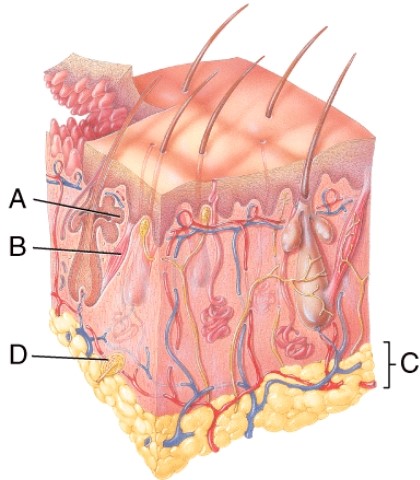


Unlock Deck
Unlock for access to all 75 flashcards in this deck.
Unlock Deck
k this deck
75
Identify the deepest layer of the skin. 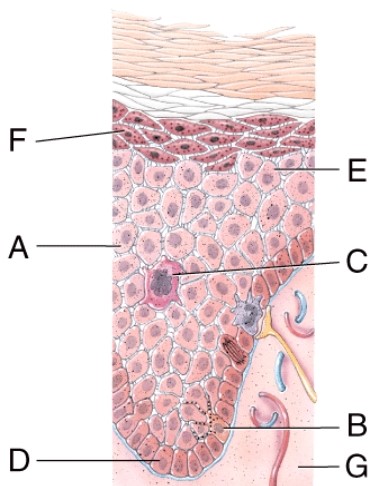


Unlock Deck
Unlock for access to all 75 flashcards in this deck.
Unlock Deck
k this deck


